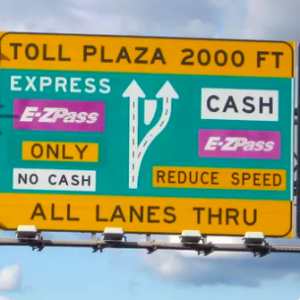It’s called “EZ Pass.” So why is America’s largest tolling system so frustrating—especially when it comes to customer service?
When politicians in Congress and state legislatures discuss ways to pay for new roads and bridges, tolls–essentially user fees–seem like a fair way to do it.
For drivers on the East Coast, EZ Pass is just one part of the landscape. The “cashless, open road tolling system” does away with manned toll booths, allowing drivers to pay tolls while passing under scanners at highway speeds on roads operated by 39 agencies in 17 states. Its implementation has improved the speed and safety of tolling transactions since drivers no longer have to stop at toll booths, which increases the risk of a rear end collision.
Even so, drivers in many states complain the systems still have glitches, especially with out of state drivers, leading to fines for late payment, consumer dissatisfaction, and even a class action lawsuit. The woes plague not just E-Z Pass, but organizations like New York’s Metropolitan Transit Authority (MTA), Florida’s “SunPass” system and others.
In several different states, drivers the systems have filed class action lawsuits against tolling authorities alleging that they misspent toll revenues or charged burdensome fines. In Pennsylvania, the National Motorists’ Association and the Owner Operator Independent Drivers Association filed suit against the Pennsylvania Turnpike Association seeking refunds of tolls that they claim were illegally used to pay for public transit. The case could result in refunds of nearly $6 billion in tolls.
And in February, a class action lawsuit against the MTA and other entities involved in toll collection was filed in New York. The lawsuit alleges that consumers are facing exorbitant penalties, including $100 fees, because the system failed to read their transponders. Despite having a balance on their accounts, they were still charged late payment fees.
“However, Defendants — who operate those systems and collect tolls from drivers — have used the cashless toll system to line their own pockets at the expense of drivers, primarily by collecting improper fees and penalties in addition to collecting the tolls,” the lawsuit says.
New York claims the system saves drivers time and money. Those involved in the lawsuit, however, have horror stories of racking up thousands in fines over the course of their daily commutes. Drivers are charged a $50 fee for each toll booth they pass through. A trip from New Jersey into the city and back can thus rack up more than $200 in fines. For a period of time in 2017, a spike in violations raised processing costs, and the price of the fine, to $70.
“I think since 2011, I’ve most likely paid about $1,000 in these assessment fines and now that I know it, it makes me even more angry,” Sarah Garcia, a Long Island resident, told a local news station. Each missed toll was only fifty cents.
Her case is still being litigated in court.
Similar problems have arisen in Florida with the SunPass tolling system. The system was supposed to be down for six days of maintenance in June. Instead, six months later, Conduent, the company hired to operate both the New York and Florida systems, is months behind in mailing Toll-by-Plate invoices, which are used when a customer does not have a transponder or the system fails. The delays follow news that Conduent potentially compromised six million customer accounts by leaving a test site on unsecured Internet connection. In the meantime, tolls haven’t been appearing on consumer accounts as they should.
Florida Sen. Bill Nelson (D) and his colleague, Sen. Gary Peters (D, MI) sent a letter to the Federal Trade Commission (FTC) chairman at the end of the summer. They asked the FTC to investigate the company “for conduct that has financially harmed the public” and asked the commission to hold the company accountable.
That might be easier said than done.
Frustration with unpaid tolls (and their associated fees) is often misplaced, says Bill Cramer, communications director for the International Bridge, Tunnel & Turnpike Association (IBTTA). The trade group represents companies and government agencies involved in the operation of toll roads and businesses that provide services to them. He explains that making a tolling system that functions across state lines is complicated.
“Right now systems are regionally interoperable, and we are working to make them intraoperable,” Cramer told InsideSources. “The hard part isn’t the technology, but the legislative process on sharing information.”
Collecting out of state tolls requires specific agreements between states on who can collect tolls and how to share the money. It also involves issues of information sharing and consumer privacy, which have to be worked out by state legislatures. Glitches in this information-sharing process can result in tolls that aren’t paid or, eventually, fines.
“It really isn’t the technology problem, it’s more the back office,” he says.
It is interesting to note that commuters from New Jersey are frequent complainers about New York’s tolling system. This suggests that there may be an issue integrating the two states’ systems.
State legislatures also set the fees associated with starting an EZ Pass account and those incurred for missed tolls. These charges are generally defended as necessary to cover the cost of looking up a driver’s information, and then printing and mailing a violation notice.
At the end of the day, tolls are another form of road tax–something that people rarely pay without grumbling. At the same time, there are 30 million transponders on the road, and most of them aren’t having problems. But if the problems that exist aren’t fixed, it may be the states and their private-sector tolling partners who are forced to pay up.

